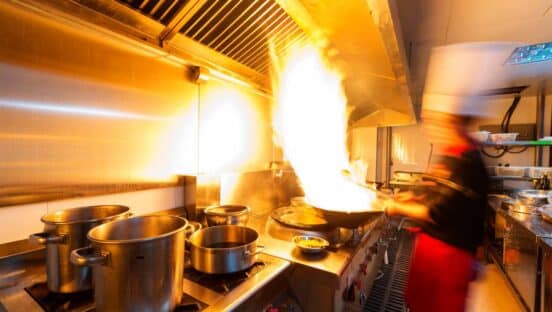Domino’s on Monday announced it will invest more than $9.6 million in frontline workers. The chain said north of 11,500 company-owned store and supply chain hourly employees and drivers will receive a special bonus in December that could total as much as $1,200.
Earlier in the year, the company paid a bonus to frontline workers at corporate locations and supply chain centers, and also provided paid time off to part-time employees impacted by COVID-19.
“We strive every day to uphold our values of doing the right thing and putting people first,” Domino’s CEO Ritch Allison said in a statement. “We have the honor and privilege of being open and operating throughout the U.S. during this crisis, and we recognize that we could not be doing it without the hard work and dedication of our team members. This is our way of saying thank you to these remarkable people.”
Like other pizza chains surging from the consumer rush toward contactless delivery and takeout, Domino’s dialed up hiring efforts in recent months. It’s in the midst of hiring an additional 30,000 people across the U.S.
The $1,200 figure, whether deliberate or not, mirrors the amount some individuals received as a stimulus check in the CARES Act, but remains a contentious point in latest relief talks. The $908 billion bipartisan proposal on the table would leave out stimulus payments, focusing instead on providing jobless workers with an additional $300 in weekly unemployment aid. On December 8, Treasury Secretary Steven Mnuchin proposed a $916 billion package that offered $600 per person, while cutting back on unemployment aid, according to the Wall Street Journal. Talks are ongoing.
For Domino’s, the brand reported blazing results throughout the pandemic. Company-owned sales increased $18.7 million in Q3 as same-store sales hiked 17.5 percent in the U.S., year-over-year—the chain’s best performance since going public 16 years ago.
BTIG analyst Peter Saleh estimated Domino’s garnered $12 million from COVID-19 demand as more guests tapped delivery and adjusted previous routines. Domino’s executives, for instance, said weekday sales and order sizes surged of late. Delivery growth also outpaced carryout during coronavirus, and this lent to larger order given delivery, by nature, flows through a higher ticket, with an added charge tossed in. Domino’s delivery fees vary market-to-market for consumers based on labor rates. It presents upfront pricing, though, with no added fees at the end.
However, as Domino’s noted, its spent heavy on workers during this boom. In Q3, it forked up roughly $11 million on hiring, bonuses, sick-pay policies, and sanitary supplies, among other COVID response tactics. General and administrative costs rose 9.5 percent to $91.7 million. And reflecting supply chain instability, commodity costs lifted 3.8 percent.
Allison said in October Domino’s expected elevated costs around safety and cleaning equipment, as well as enhanced sick pay “as long as we’re operating in a pandemic environment.” Additionally, the company said it planned to offer enhanced compensation for employees throughout the crisis, although it did not hint specifically at Monday’s bonus program.
Additionally, throughout the summer, Domino’s and franchisees conducted a “Feed the Need” program where it donated more than 10 million slices of pizza to first responders, frontline workers, and those in need in communities, including hospital workers, doctors, nurses, and grocery store employees.
Systemwide at Q3’s exit, Domino’s boasted fewer than 300 temporary closures, down from a peak of 2,400 in late March. The company’s net income increased about 15 percent to $99.1 million in Q3. Total revenue rose 17.9 percent to $967.7 million
Worker benefits have been a hot topic for quick-serves in recent weeks. Starbucks sent a memo last week saying the chain would bump in-store workers’ pay by at least 10 percent starting Monday. Within the next three years, CEO Kevin Johnson said the brand would pay all U.S. employees a minimum wage of $15.
With the recent pay increase, more than 30 percent of Starbucks’ domestic employees are currently at or above $15 per hour. Currently, the federal minimum wage is $7.25 per hour for covered, nonexempt employees.
President-elect Joe Biden has expressed support to lift the federal rate to $15 an hour, but would need Congressional approval to do so.
He’s also touted an end to tipped minimum wages and sub-minimum wages for people with disabilities, and outlined a proposal to pass the PRO Act and shared a Paycheck Fairness Act to ensure women receive equal pay for equal work. Another suggested work change would extend COVID-era crisis insurance for unemployed workers and universal paid sick days and 12 weeks of family and medical leave per year.














